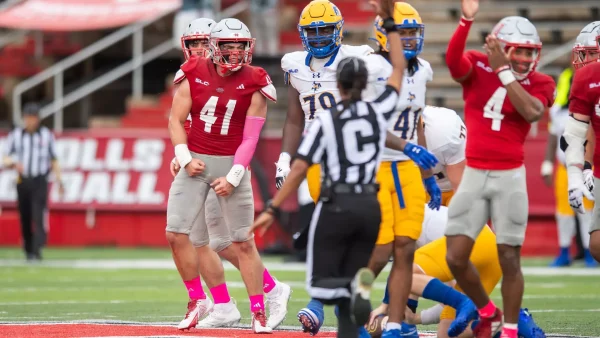Representative Richard to introduce bills to help higher education
Louisiana State Representative Jerome “Dee” Richard will be introducing five bills that could save the state millions of dollars to be spent on higher education. He is calling it the “Reestablishing the Legislative Government Package.”
The first bill in the package is House Bill 30, which could provide a short-term solution to the higher-education funding problem. HB30 is the same as HB142, which passed unanimously in both houses last year only to be vetoed by the governor.
“The bill says any contract that comes up for renewal for $40,000 or more would have to go before the joint committee on the budget. If they didn’t like it, that money would go to higher education,” Richard said.
According to Richard, there are around 20,000 government contracts with the state, but only 100 or so are actually monitored. The rest are reapproved no matter what.
House Bill 31 will call for an automatic veto session.
When the governor vetoes a bill that passed by a 2/3 vote in both the house and senate, the legislators go home with a ballot to decide if they want to go back to the capital to vote on it again.
Richard said that if HB31 passes, “Any time a bill passes with a 2/3 vote in each side and the governor vetos it, it’s going to automatically call us back to Baton Rouge to vote on that bill.”
Richard said, “Most people don’t know that we’re voting by secret ballot, so this will make us vote in public.”
“If you have an automatic veto session, it’s harder for him to control that vote when you know you’ve got to go back to Baton Rouge. Right now, he can coax you into staying home,” Richard said.
“We passed [HB142] unanimously, everybody voted for it, yet when it came time to vote to go back, we didn’t vote to go back. So that tells you he gets to people. Once you get home and you know you can hide behind that secret ballot, it’s a lot easier,” Richard said.
The next bill in his package is House Bill 32, which will attempt to do away with the governor’s line item veto power for appropriation bills.
Line item veto is the governor’s power to reject individual provisions of a bill.
“Right now, the board of regents is looking at the budget,” Richard said. “They’re going to come up with some ideas and give it to us in session. It’s going to be up to us to make decisions on how to solve higher education’s problem. We’re not going to do it.”
“We’ve tried to merge schools, but we didn’t do it,” Richard said. “We don’t have the guts to do it. It should have been done, but it wasn’t done.”
Richard said, “Their only solution is going to be to raise tuition, and that is not the solution to this problem.”
“We’re going to end up doing nothing, and so once we balance the budget, higher education’s probably will still get cut, and the governor can come in with an ink pen after we’re gone and he can line item what he doesn’t want,” Richard said. “In other words, if Nicholls doesn’t get cut because of us, he can come and say, “I want to cut Nicholls,” Richard said.
This bill would say that once the budget is balanced, the governor could not line item veto anything.
Richard said that the bill will probably not pass because lawmakers “don’t have the guts to do it.”
“The automatic veto session might have a chance, but the line item veto is going too far for some of these guys, and they won’t stand by it,” Richard said.
Richard’s fourth and fifth bills are prefiled, but do not have numbers yet.
The fourth bill would eliminate nongovernment organizations (NGO) that are funded by the state government.
The state currently helps fund many NGOs, including the New Orleans Saints football team and the Pelicans basketball team, according to Richard.
“It’s crazy. We should not be funding NGOs. We should be funding higher education,” Richard said.
According to Richard, this would save anywhere from half a million to one billion dollars.
The Councils on Aging, which provides services like Medicaid application assistance, discounts on medical alert systems or meals delivered to the homebound, would also be considered NGOs. Cutting the funding to all NGOs would severely impact the Councils on Aging.
“The Councils on Aging is an NGO, but they should be a government service, because they serve retirees,” Richard said. “They should be automatically in the budget every year because it’s a service the government should be doing.”
Richard said that the Councils on Aging would probably be grandfathered into the budget if his bill passes.
The fifth and final bill in Richard’s package is the capital outlay bill.
“Right now, when projects are introduced through capital outlay, the governor has final say so,” Richard said. “We leave session, and we can’t fund them all. He decides which ones will be funded.”
If this bill passes, it will put an end to some of the favoritism or the “good ole boy” network and give legislature some oversight on what the governor wants to do, according to Richard.
Although he firmly believes in them, Richard is not confident that all the bills will pass.
“These are good government bills that should be passed to take back controls that we give the governor that makes him so powerful,” Richard said.
Richard is also presenting a House Rule, which would change the number of members in the appropriations committee from 27 to 15.
“I bring bills that want to change the state of Louisiana,” Richard said. “I get laughed at a lot. This is nothing new for me. I’ve been trying to reform the government since I got elected. That’s what I got elected to do and that’s what I’m going to keep trying to do.”
Richard was a guest speaker at the Student Government Association on Monday, and said that this is not just a Nicholls problem, “it’s a higher education problem.”
“We have a spending problem in this state,” Richard said. “Raising tuition is not the answer.”






